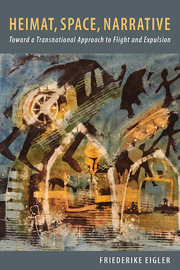Book contents
- Frontmatter
- Dedication
- Contents
- Acknowledgments
- Introduction: Geocritical Approaches to Place-Bound Belonging
- Part I Reassessing the Study of Heimat, Space, and Postwar Expulsion
- Part II Horst Bienek's Novels on Upper Silesia (1975–82)
- 4 Writing, Attachment to Place, and Jewish Expulsion in Bienek's Tetralogy
- 5 Spatial Practices in Bienek's Tetralogy
- Part III Contemporary Novels
- Conclusion: “Lived Spaces” in Literary Narratives
- Filmography
- Works Cited
- Index
4 - Writing, Attachment to Place, and Jewish Expulsion in Bienek's Tetralogy
from Part II - Horst Bienek's Novels on Upper Silesia (1975–82)
Published online by Cambridge University Press: 05 August 2014
- Frontmatter
- Dedication
- Contents
- Acknowledgments
- Introduction: Geocritical Approaches to Place-Bound Belonging
- Part I Reassessing the Study of Heimat, Space, and Postwar Expulsion
- Part II Horst Bienek's Novels on Upper Silesia (1975–82)
- 4 Writing, Attachment to Place, and Jewish Expulsion in Bienek's Tetralogy
- 5 Spatial Practices in Bienek's Tetralogy
- Part III Contemporary Novels
- Conclusion: “Lived Spaces” in Literary Narratives
- Filmography
- Works Cited
- Index
Summary
Horst Bienek's life and work were shaped by traumatic experiences in the “age of extremes,” as Eric Hobsbawm has called the short twentieth century. In 1946, at the age of sixteen, Bienek was expelled from his hometown of Gleiwitz in Upper Silesia, because of the redrawing of the German-Polish borders. In 1951, as a student of Bertolt Brecht at the Berliner Ensemble, he was accused of anti-Soviet activities and sentenced to twenty years of forced labor in Workuta (which was part of the Gulag, the extensive Soviet prison system). After his early release in 1955, he settled down in West Germany, where he established himself as a literary critic with the Hessischer Rundfunk (radio), an author, and an ardent supporter of dissident writers from Eastern Europe. While he also wrote about his time in the Soviet labor camp, the major creative preoccupation of his life became the border region of Upper Silesia.
Bienek spent ten years, roughly the decade between 1972 and 1982, writing his four Gleiwitz novels, which total 1,450 pages. Just a few years earlier he had ruled out the possibility of ever writing about Silesia, as a project of this kind smelled too much of Heimattümelei, that is, of an ideologically suspicious embrace of Heimat (Beschreibung, 12). In the work diary that he revised and published after the completion of the tetralogy, titled Beschreibung einer Provinz (Description of a Province), he comments on the biographical context of what seemed like an about-turn.
- Type
- Chapter
- Information
- Heimat, Space, NarrativeToward a Transnational Approach to Flight and Expulsion, pp. 77 - 102Publisher: Boydell & BrewerPrint publication year: 2014

